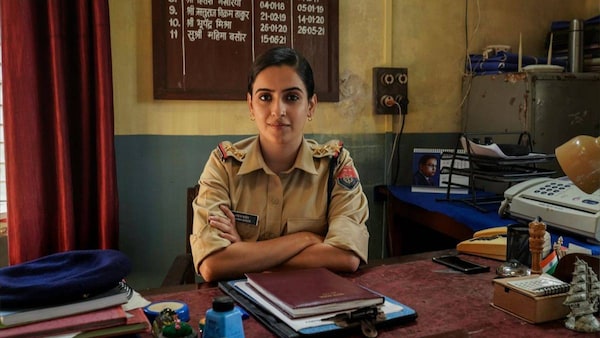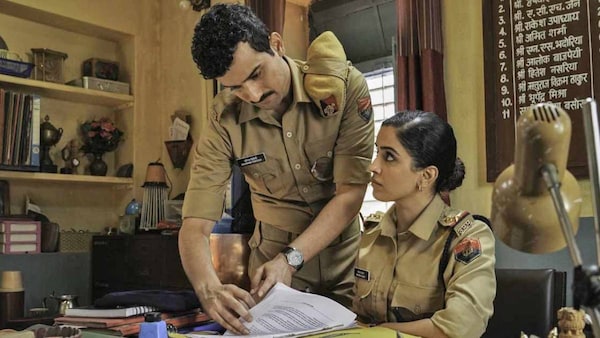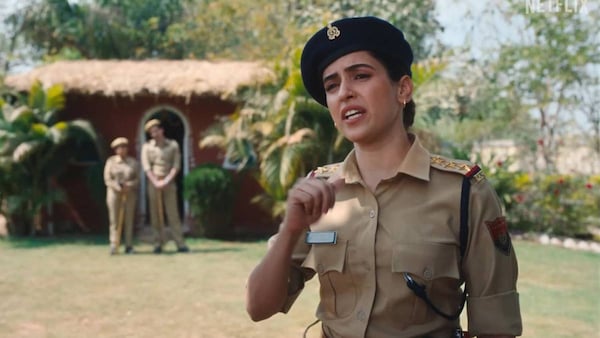Kathal's Ripe Premise Bears Little Fruit
This is #CriticalMargin, where Ishita Sengupta gets contemplative over new Hindi films and shows. Today: Sanya Malhotra's Kathal.

Last Updated: 11.51 AM, May 20, 2023
FOR the second time this month, young girls in Hindi films and shows are disappearing from India’s remote districts. For the second time — again — the police officer entrusted with the task of finding them is a lower-caste woman, who has to fight for justice as much as fight against the prejudices stacked against her. But the difference between both the outings is so vast, in treatment, style and writing, that the presence of one aids in examining what is lacking in the other.
As a premise, Yashowardhan Mishra’s woeful Kathal bears striking resemblance to Reema Kagti-Ruchika Oberoi’s terrific Dahaad. The crisis of lost girls subjected to social indifference forms the narrative epicenter in both, which is arrived at through designed smokescreens. But, if the Sonakshi Sinha-headlined series made a case for nuanced depiction of gender and caste discrimination, then the Sanya Malhotra film is so heavy-handed in approach that it just stops short of making a mockery of it.
In a district called Moba (presumably a fictional counterpart of Uttar Pradesh’s Mahoba), a local MLA raises hell when two imported jackfruits (kathal) from his garden go missing. The seemingly harmless fruit is tied to his political ambition and MLA Pateira (the ever dependable Vijay Raaz) will leave no stone unturned in finding the culprit. His radar of suspicion runs wide and includes his son-in-law and the gardener he had fired just the day before the incident occurred. The moment he informs the Moba police, inspector Mahima Basor (a sincere Sanya Malhotra) is ordered by her superiors to find the jackfruits before they ripen.

On paper, this absurdity alone makes for a potent setting for a satire. After all, the law and order machinery bending to politicians’ whims and fancies makes for common instances in a country like India. This is further heightened when Basor chances upon the sudden disappearance of the gardener's daughter amidst the investigation of a fruit, a narrative detail the film ties to a sketchy human trafficking subplot. That she continues to be pressured to find an inanimate object even when scores of girls are missing from the place informs the point of Kathal, and that Basor is viewed as a lower-caste woman by her colleagues and the rest (her profession notwithstanding) forms the politics of the film.
Having said that, Kathal possesses neither the bite nor the sharpness to offer social commentary. The writing (Ashok and Yashowardhan Mishra are credited) is so juvenile that there is no balance between tonality and criticism, making the film an inadvertent comedy. Critical information like the fact that 43 girls are missing or that Basor has to navigate a system that has been built to humiliate her, are glossed over in the film’s preoccupation to be funny. This is a dangerous proposition because the matters at hand here — implication of a human trafficking racket, slut shaming of women, gender and caste discrimination, and the susceptibility of journalists to being incarcerated for doing their jobs — are pressing. The ambition of Kathal, however, is so limited to evoking laughter that these issues devolve into gags, making the film a spoof of the spoof it was aiming to be.
Such narrative myopia further manifests in the depiction of characters as caricatures. It is honestly laughable, the laziness with which Kathal characterises the people in the frame. Basor’s boss is an obviously dishonest police officer, prone to stealing others’ achievements. The film underlines his inflated ego by portraying him as a man who drinks from a mug that bears his own face. Other than this little nugget, the role essayed by Gurpal Singh is lent zero arc. Similarly, the corruption and greed in another police officer is highlighted by presenting him as a man who remains hung up on the robbery of his new car from beginning to end. The most troubling is Malhotra’s character.

The layered minority status of her identity grants a spectrum of possibilities to explore from but the film is neither equipped nor interested in such examination. Basor is too vague a personality to invest in. She is in love with a higher-caste constable (Anant V Joshi) whose family is against their marriage. Basor knows right from wrong, her politics from politicians. She stands up for a female colleague in front of the latter’s husband, yet is crestfallen when she gets a promotion as that amplifies the hindrance to her wedding plans. The dichotomy can be interesting but the all-round inept writing makes it jarring. Having a competent actor like Malhotra in the role does offset the jolt to an extent but I’d argue the duality is an example of limitation and not design.
This points to the film’s bigger problem wherein it brings together actors like Raaz, Rajpal Yadav (lessened to a sad mockery of a sincere ground reporter), Raghubir Yadav, Brijendra Kala, Govind Pandey and criminally wastes their potential. It is a sad sight because they are so good that at several moments they rise above the mediocrity of the setting to remind us of their elevated craft. More crucially though, for a film named after a particular fruit, the outing unfolds in abject genericness, mistaking laughs for humour and slapstick for subversion. I detest using food analogies in film writing but I ought to say: this Kathal is tasteless.

 Premium
Premium